To create an effective email for perfect parent-teacher communication, start with a clear subject line like "Academic Performance Update." Introduce yourself and state the purpose of your email directly and respectfully. Address specific concerns, such as homework expectations or behavioral observations, while expressing appreciation for the teacher's efforts. Keep your message concise and error-free to avoid misunderstandings. Remember, consistent communication strengthens relationships and encourages collaboration. Conclude with a thank-you note after their response to foster ongoing dialogue. For tips on structuring your email or examples to inspire you, consider what comes next.
Key Takeaways
- Start with a clear subject line that summarizes your email, such as "Academic Performance Update" or "Behavioral Concerns Discussion."
- Include a brief introduction stating your purpose, maintaining a respectful and professional tone throughout the email.
- Address specific concerns like academic performance or behavioral observations, and inquire about homework expectations for better alignment.
- Express appreciation for the teacher's efforts and highlight your child's achievements to foster a positive relationship and open dialogue.
- Proofread your email for clarity and conciseness, ensuring it remains free of spelling or grammar errors before sending.
Introduction
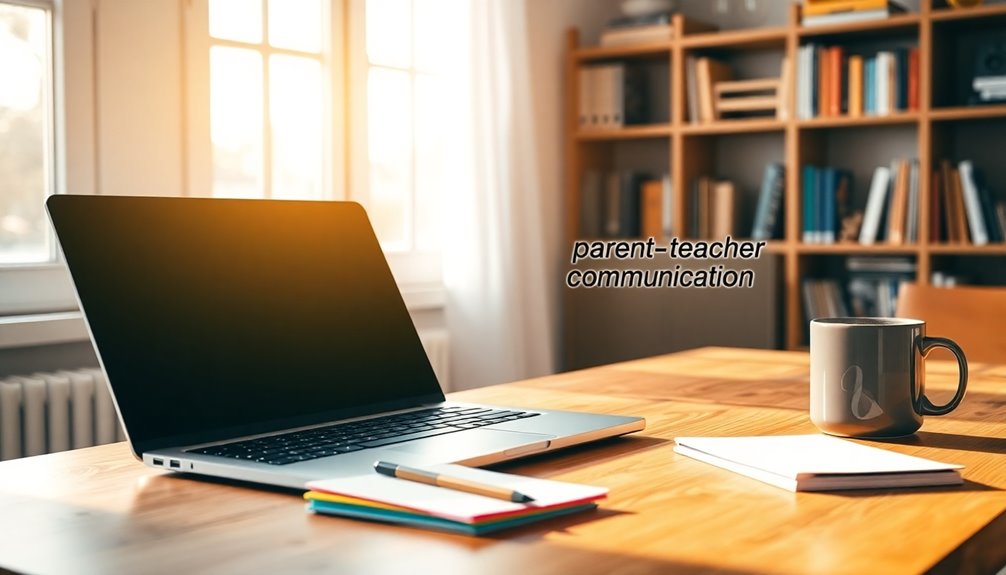
Effective communication between parents and teachers plays a crucial role in student success. When you engage with your child's teacher, you're not just exchanging information; you're fostering a collaborative environment that enhances your child's learning experience in the classroom.
Clear and concise emails can help you avoid misunderstandings and ensure that vital information reaches the teacher effectively. Using a professional tone in your emails establishes respect and authority, which are essential for productive conversations.
Including specific details—like dates, assignments, or any concerns—enhances clarity and allows for focused discussions that can lead to meaningful outcomes. Regular updates and open dialogue through email help build strong relationships between you and the teacher.
When you're informed about your child's progress and classroom activities, you can better support their academic journey at home. This consistent communication not only benefits the student but also creates a united front between parents and educators, ensuring everyone is on the same page.
Builds Trust With Parents

How can consistent email communication build trust between parents and teachers? When you regularly update parents through emails, it fosters a strong home-school connection. This transparency allows parents to stay informed about their child's academic progress, reinforcing their confidence in your commitment to their education. Additionally, sharing insights about Montessori-inspired practices can empower parents to support their child's learning at home.
Utilizing effective email templates can streamline your communication, ensuring that you address specific concerns or successes clearly and concisely. This approach creates an open dialogue, which is essential for building trust. By recognizing a child's achievements or addressing individual needs in your emails, you demonstrate that their well-being is a priority.
Additionally, consistent communication practices, including timely responses to inquiries, showcase your professionalism and reliability. Parents are more likely to trust teachers who actively engage with them and keep them in the loop.
In essence, by using well-crafted email templates and maintaining regular communication, you can enhance the trust between you and parents. This connection not only benefits the students but also creates a collaborative environment where everyone feels valued, leading to a more successful educational experience for all involved. Furthermore, the emphasis on community and support networks in personal development highlights the importance of fostering strong relationships between educators and families.
Clear Subject Line
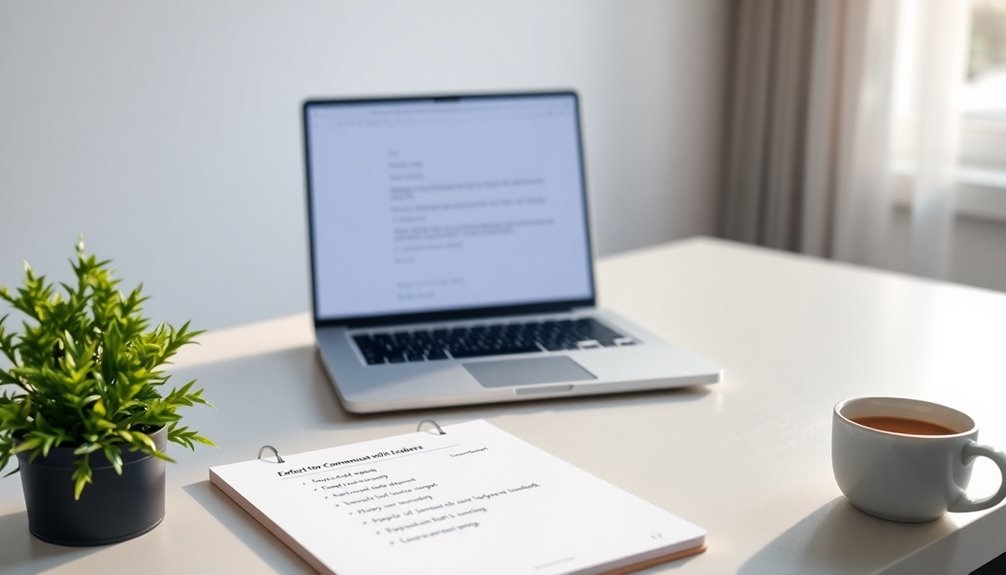
Consistent communication is key to building trust, and a clear subject line is a vital part of that process. When you send an email to your child's teacher, a well-crafted subject line helps them quickly identify the email's purpose, making it easier for them to respond efficiently. Consider using specific keywords like "academic performance" or "behavioral concerns" to enhance your message's relevance.
Aim for a concise subject line of about 5-8 words. This length captures attention without overwhelming the recipient. For added clarity and organization in ongoing correspondence, you might adopt a standardized format, such as "Inquiry: [Child’s Name] – [Topic]." This way, the teacher can immediately understand what your email pertains to.
Additionally, including dates or specific events, like "Question about Upcoming Parent-Teacher Conference," helps prioritize urgent matters. Teachers appreciate emails that are straightforward and to the point.
Crafting Effective Parent Emails

Regularly crafting effective emails to your child's teacher can significantly enhance communication and support your child's education.
Start with clear and concise subject lines that immediately convey the email's purpose. This helps the teacher prioritize their responses and understand your classroom needs right away.
Include specific details such as dates, assignments, and your child's name to provide context. This allows the teacher to quickly grasp the situation and respond more efficiently.
Maintain a respectful tone by utilizing professional language; avoid emotional or accusatory phrases to foster constructive dialogue.
Remember to close your email politely, expressing appreciation for the teacher's time. This not only shows respect for their workload but also encourages a positive relationship. Additionally, being mindful of emotional expression during communications can foster a supportive environment for your child.
Regular follow-ups, like sending thank-you emails or asking for meetings, can further solidify this connection.
Pro Tips for Maximizing Impact
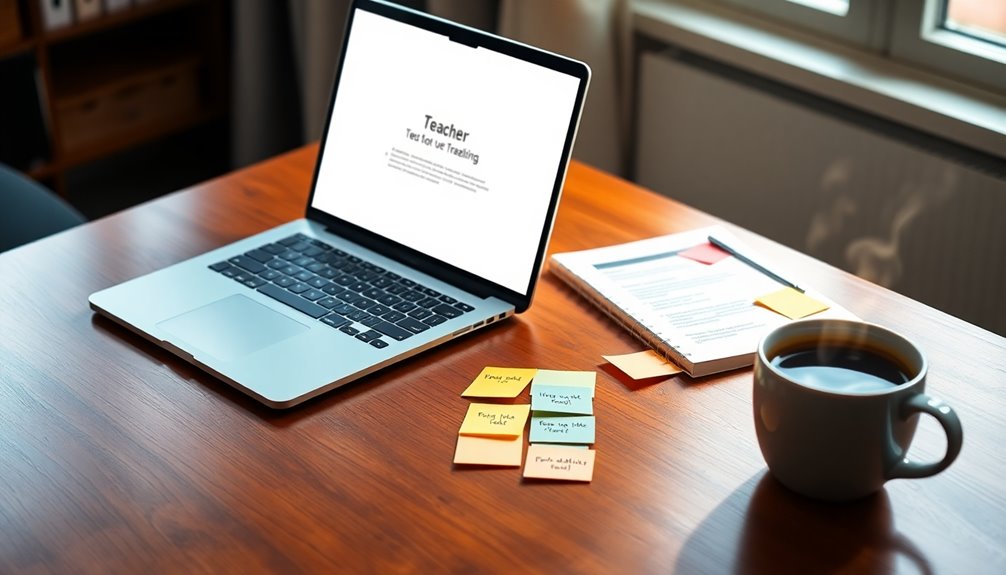
Maximizing the impact of your emails to your child's teacher involves a few strategic approaches. Start by crafting clear subject lines that indicate the purpose of your email. This helps the teacher prioritize their response and ensures effective communication.
When you begin your email, include a concise introduction that establishes your relationship to the student; this sets the context for the teacher and aids in personalized communication.
Next, outline specific questions or concerns in a structured format. This makes it easier for the teacher to address your points and keeps the dialogue focused. Remember, finding the right words can make a significant difference in how your message is received.
Don't forget to close your email politely and respectfully, expressing appreciation for the teacher's time. This fosters a positive relationship and encourages open communication.
Lastly, regularly monitor your child's progress and prepare follow-up emails as needed. Keeping the lines of communication open ensures ongoing engagement and collaboration with the teacher throughout the school year, ultimately benefiting your child's educational experience.
Common Mistakes to Avoid
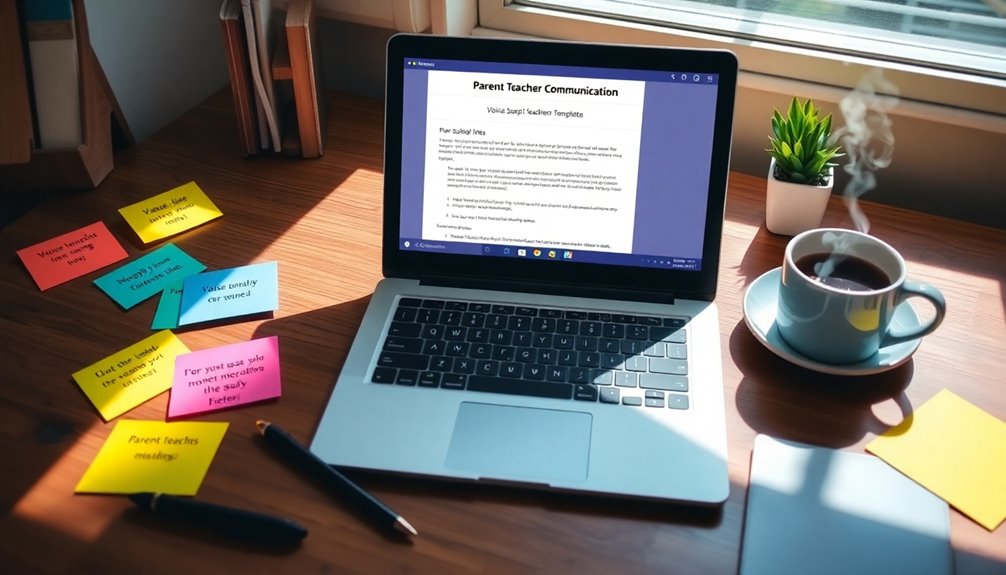
Many parents make common mistakes when emailing their child's teacher that can hinder effective communication. First, avoid using emotional or accusatory language. This can lead to misunderstandings and make the teacher defensive, which isn't helpful for anyone. Instead, focus on clear and constructive language.
Next, ensure your subject line is straightforward and relevant. This helps the teacher prioritize their responses effectively. Also, don't forget to proofread your email for any spelling or grammar errors. Mistakes can undermine your professionalism and the seriousness of your concerns.
Keep your email concise by avoiding overly complex sentences. Aim to get to the point quickly so the teacher can easily understand your main message. Additionally, refrain from sending multiple emails on the same topic. This can overwhelm the teacher and make it challenging for them to address your concerns comprehensively.
Lastly, if your child needs to practice reading, mention it clearly without mixing it with other topics. This way, the teacher knows exactly what you expect and can respond accordingly.
Positive Feedback Email Example

—
Subject: Thank You for Your Support!
Dear [Teacher’s Name],
I hope this email finds you well! I wanted to take a moment to express my gratitude for the incredible support you've given [Child’s Name] this year.
I've noticed significant improvements in their [specific skill, e.g., reading comprehension], which I believe is due to your engaging teaching methods. Professional counseling can often enhance emotional detachment in students, allowing them to connect better in a learning environment.
Just last week, [Child’s Name] shared an exciting story they wrote in class, showcasing their creativity and newfound confidence. It's heartwarming to see them so enthusiastic about learning, and I genuinely appreciate your efforts in nurturing that passion.
Thank you for your dedication and for creating such a positive learning environment. If you have any additional suggestions or resources to further support [Child’s Name]'s growth, I'd love to hear them.
Looking forward to your continued guidance!
Warm regards,
[Your Name][Your Contact Information]—
This example highlights your child's achievements while fostering a collaborative relationship with the teacher.
Final Thoughts
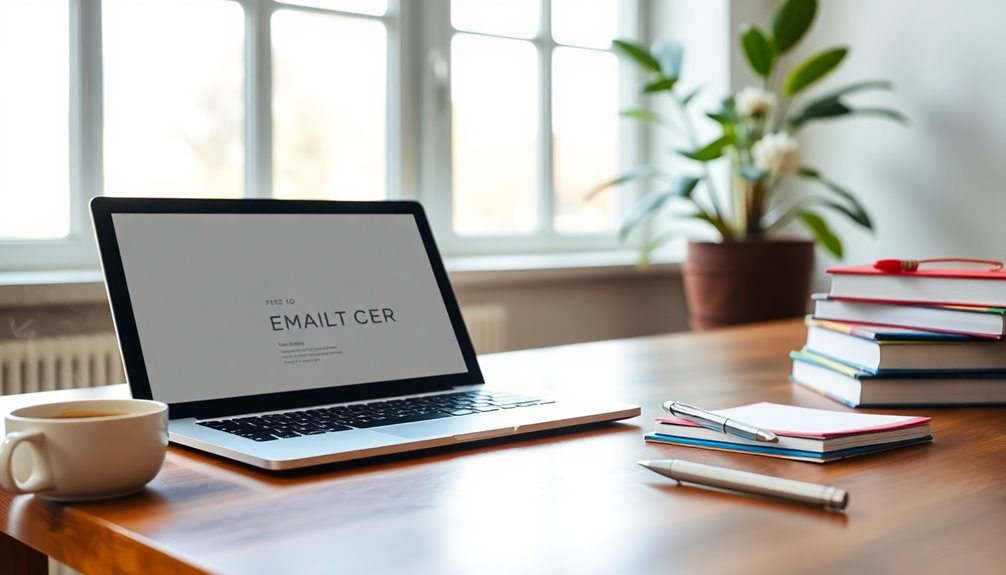
To wrap things up, effective communication with your child's teacher can truly make a difference in their educational journey. By reaching out, you can gain valuable insights into your child's progress, including their mastery of sight words and overall academic performance.
A well-structured email is key; ensure you have a clear subject line and a concise introduction that outlines your purpose.
Don't hesitate to discuss any specific concerns, such as behavioral observations or homework expectations. Remember, polite language and proofreading are essential to maintain respect and clarity in your communication. This sets a professional tone and fosters a positive relationship with the teacher.
Additionally, being open to active listening can enhance your understanding of the teacher's perspective and contribute to a more collaborative relationship. Once you receive a response, follow up with a thank-you email or additional questions. This reinforces your engagement and keeps the communication lines open.
Frequently Asked Questions
How Do You Effectively Communicate With Parents as a Teacher?
To effectively communicate with parents, you'll want to provide regular updates on student progress, encourage questions, and maintain a professional tone. Clear, concise messages foster collaboration and strengthen relationships, supporting your students' overall success.
How to Write an Email From Parent to Teacher?
To write an effective email to your child's teacher, start with a clear subject line, introduce yourself, state your concerns or questions politely, and include your contact information for further communication.
How Do You Write an Appreciation Email to a Teacher From a Parent?
To write an appreciation email to a teacher, start with a warm greeting, mention specific positive impacts on your child, and express gratitude. Close with an offer to support their efforts in any way you can.
How Do I Write an Email to a Parent From a Teacher About Behavior?
To write an email about behavior, start with a clear subject line. Introduce yourself, outline specific concerns with examples, suggest solutions, invite collaboration, and express appreciation for the parent's involvement in their child's education. To maintain a professional and constructive tone, focus on the behavior rather than the child, ensuring the email remains solution-oriented. Avoid language that could be perceived as judgmental, and instead emphasize shared goals for the student’s growth and success. If needed, you can adapt similar strategies to compose an email draft for your therapist, tailoring the message to address concerns or seek guidance effectively.









